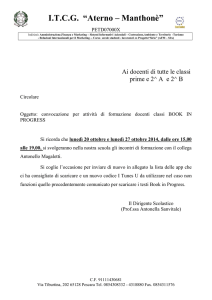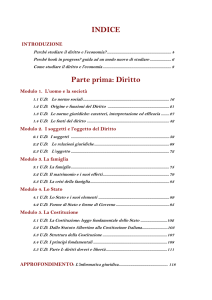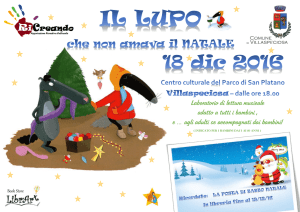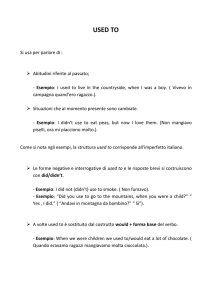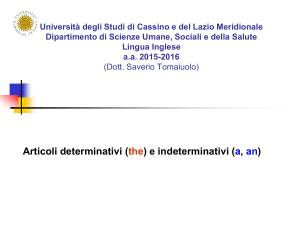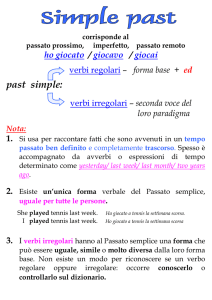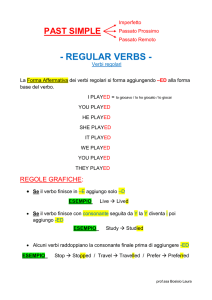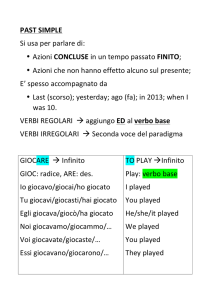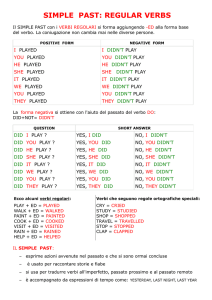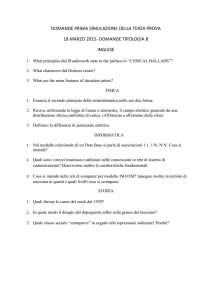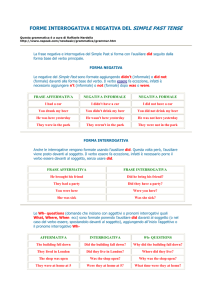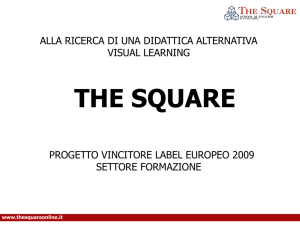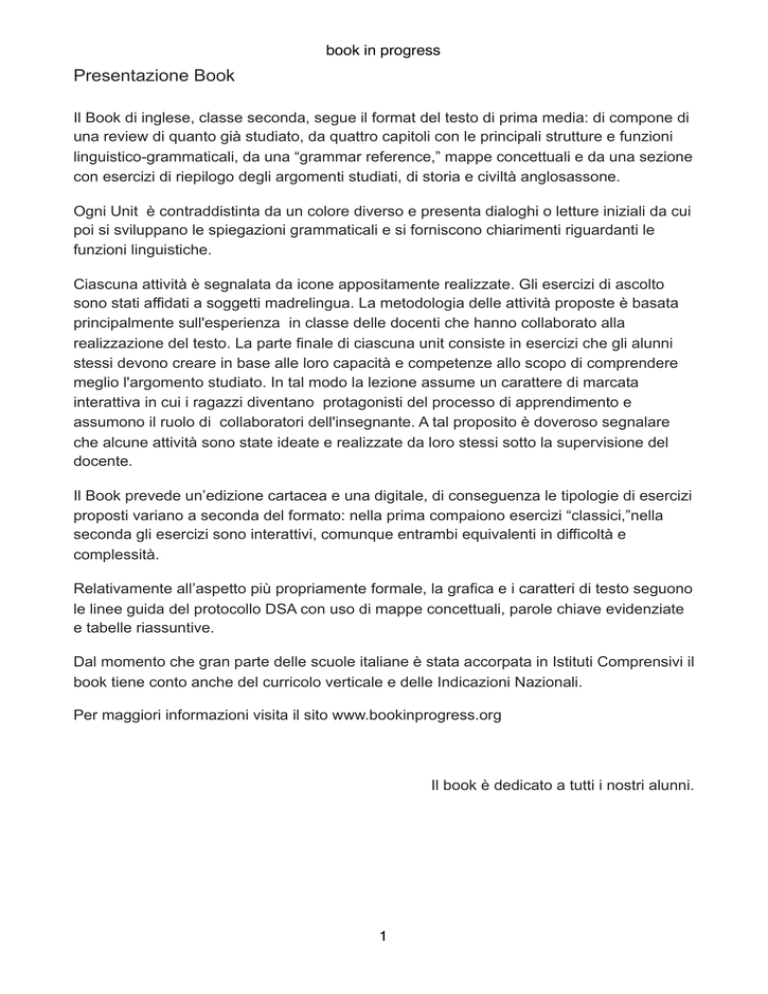
book in progress
Presentazione Book
Il Book di inglese, classe seconda, segue il format del testo di prima media: di compone di
una review di quanto già studiato, da quattro capitoli con le principali strutture e funzioni
linguistico-grammaticali, da una “grammar reference,” mappe concettuali e da una sezione
con esercizi di riepilogo degli argomenti studiati, di storia e civiltà anglosassone.
Ogni Unit è contraddistinta da un colore diverso e presenta dialoghi o letture iniziali da cui
poi si sviluppano le spiegazioni grammaticali e si forniscono chiarimenti riguardanti le
funzioni linguistiche.
Ciascuna attività è segnalata da icone appositamente realizzate. Gli esercizi di ascolto
sono stati affidati a soggetti madrelingua. La metodologia delle attività proposte è basata
principalmente sull'esperienza in classe delle docenti che hanno collaborato alla
realizzazione del testo. La parte finale di ciascuna unit consiste in esercizi che gli alunni
stessi devono creare in base alle loro capacità e competenze allo scopo di comprendere
meglio l'argomento studiato. In tal modo la lezione assume un carattere di marcata
interattiva in cui i ragazzi diventano protagonisti del processo di apprendimento e
assumono il ruolo di collaboratori dell'insegnante. A tal proposito è doveroso segnalare
che alcune attività sono state ideate e realizzate da loro stessi sotto la supervisione del
docente.
Il Book prevede un’edizione cartacea e una digitale, di conseguenza le tipologie di esercizi
proposti variano a seconda del formato: nella prima compaiono esercizi “classici,”nella
seconda gli esercizi sono interattivi, comunque entrambi equivalenti in difficoltà e
complessità.
Relativamente all’aspetto più propriamente formale, la grafica e i caratteri di testo seguono
le linee guida del protocollo DSA con uso di mappe concettuali, parole chiave evidenziate
e tabelle riassuntive.
Dal momento che gran parte delle scuole italiane è stata accorpata in Istituti Comprensivi il
book tiene conto anche del curricolo verticale e delle Indicazioni Nazionali.
Per maggiori informazioni visita il sito www.bookinprogress.org
Il book è dedicato a tutti i nostri alunni.
1
book in progress
SIGNIFICATO DELLE ICONE:
READING
WRITING
LISTENING
VIDEO
TRANSLATION
CORNER
BE
CREATIVE
IT’S YOUR
TURN
SPEAKING
GRAMMAR
FOCUS
GAME
CORNER
DANGER
ZONE
CLIL ZONE
HISTORY
MATHS
ROAD SIGN
REMEMBER
GEOGRAPHY
2
book in progress
Qui di seguito alcune pagine del testo di seconda media
REVISION UNIT
Hi, I’m a new student. I want to introduce myself. My name is Sarah and my surname is Smith. I
was born in Dublin on July 2002. I'm Irish. I live in Dublin, my phone number is 0896688**** and
my email address is sar****@gmail.com. I have got blue/green eyes and there are four people in
my family: my mum Monica, my dad Robert, my sister Katie and me. I have also got a dog. Her
name is Winnie. She's nine months. My favourite books are Harry Potter. My favourite channel is
Disney Channel and my favourite films are Harry Potter films. My favourite actress is Emma
Watson. My favourite sports are hockey and swimming. My favourite animals are dogs. My
favourite food is pizza.
1) Fill in the gaps with your information and then try to write a similar
presentation of yourself !
Surname ........................................ height..........................................
Name ........................................... weight ..........................................
Place of birth................................... eyes ............................................
Date of birth ................................... hair ..............................................
Nationality .................................... Address .......................................
Telephone number...........................
In my family there are............. people:..................................................
Favourite books .......................................
Favourite hobbies and games ……………
Favourite tv programmes ............................................... Favourite singers actors……………………
Favourite sports ............................................................ Favourite team ..................................
Favourite sport champions............................................... Favourite animals .............................
Favourite flowers .........................................................
……………………………………..
I usually spend my free time with:
……. my friends …….. my family ( parents, brothers or sisters, cousins, grandparents, etc)
…….other adults ………my school friends ……..alone
3
book in progress
During my free time I usually
•
read books, comics or magazines...............................
•
play videogames or computer games ...........................
•
do a sport .............
•
watch the television.
•
listen to music ...................
•
use social networks
•
go out with friends ……. surf the net…… draw or paint ….. play an instrument…….
go to the cinema ……. play outside……..
I
usually watch television:……less than an hour a day……from two to three hours a day
……from 1 to 2 hours a day ………. for more than 3 hours a day
…… with my friends
…… with my family
……alone 2) List three things you can do well and three that you can't do but that you
would like to learn
I can ................................., ............................................and ………………………………… .
I can't ....................................., .......................................... …………………………………..
4
book in progress
Verbs
Functions
Present Simple Be
-am
-is
-are
Personal info: name, age, address,
favourite, ecc…..
My……… is………..
I’m tall
These are……….people in my
family
Present simple Have
Have got
Have got
Has got
Possessions / family / physical
description……..
I have got……….. hair /eyes
Can
Can
Abilities………..
I can play football…….
Present simple
I watch TV
He watch-es TV
Habits / routine / free time
activities…
I watch TV with my brother
In my free time I usually read
comics or surf the internet
Present continuous
-am playING
-is playING
-are playING
Actions of this moment
I am playing football now
1)Complete the following sentences using “to be” verb
1) They ………..at home tonight.
2) You …… a good teacher.
3) She ………..not a painter.
4) They …………students.
5) I………. not Spanish.
6) These exercises ………. very difficult.
2) Turn into plural the following sentences
1) She is Paul’s teacher.
2) He is Marie’s brother.
3) It is Simon’s book.
4) You are Mrs.Brown’s friend.
5) I am Mr.Bean’s aunt.
5
book in progress
…………………………………………..
1) Complete the sentences using “have got” or “has got”
1) I……………..a cousin.
4) She………….two brothers.
2) We………….…a car.
5) You…………..a sister.
3) They …………. three dogs.
6) He …………… a son.
2) Translate the following sentences
1) Dove trascorri le tue vacanze? Di solito vado a Viareggio con I nonni.
2) Tom fa la doccia ogni mattina prima di andare a scuola.
3) Il sole splende nel cielo.
4) Spesso faccio I compiti prima di andare in piscina.
5) I Green Day sono un gruppo musicale molto famoso.
…………………………………………
6
book in progress
Unit 1
A NEW ENTRY
In questa Unit imparerai a:
•
Chiedere e dire la data. I numeri ordinali.
•
Esprimere preferenze e non.
•
L'uso degli indefiniti.
•
Parlare di eventi futuri programmati.
•
Discutere su quali cibi sono più salutari.
•
Parlare del lessico utilizzato in matematica.
7
book in progress
Teacher: Good morning.
Students:Good morning teacher.
Teacher: Today there's a great new.
Students: Oh what's about?
Teacher: I'm introducing you to a new pupil.
Students: Oh great.
Teacher: She is English and you can ask her some questions.
Maria: Where are you from?
Helen: I'm from London.
Marco: How old are you?
Helen: I'm 13 years old.
Gianni: Where do you live?
Helen: I live in Bari.
Luca: Do you like ice cream?
Helen: Yes I do.
Gianni: Do you like fish?
Helen: No I don't.
Stefano: And do you like chips?
Helen: Oh yes very much.
Stefania: Do you like vegetables and meat?
Helen: Well,I hate vegetables but I prefer meat.
Gianna: Mum says vegetables are healthy.
Luca: My mum says chips are unhealthy but I don't like listening to her. I'd like eating what I prefer,
like eating no bread and don't drink any milk.
………………………………….
1) Read the following Math operations
32x4=128;
11-4=7;
10x4=40;
50:5=10
2)Now write the numbers that your teacher says
……………………………………….
8
book in progress
PRESENT CONTINUOUS
PER IL FUTURO
L'anno scorso hai usato il present continous per azioni in via di svolgimento, dicevi infatti "Now I'm
writing a letter". Puoi anche usarlo quando ci sono azioni future certe, programmate e stabilite. Ex:
"John what are you doing tomorrow?" "I’m writing a letter".
ll present continuous con valore di futuro è accompagnato da espressioni come 'tomorrow,
tomorrow morning, afternoon, evening, next, next week, Sunday, month, year, this afternoon,
evening, weekend, on Tuesday...”
6) Complete the sentences using the present continuous and then say if it is used as future
or present
1) What………….. you (read)………….?
2) I’………… (read) …………… a newspaper.
3) What time …………….. you (leave)………………… home tomorrow?
4) What ………….. Sam (do) ……………… next month?
5) Why …………… the girls (run) ……………. now?
6) What……….. you (eat)………… for dinner?
7) ………… your dad (drive)………… you to school?
…………………………………………..
Ask your friends about their activities for their next days
…………………………………..
9
book in progress
MY EATING HABITS
Read and listen this essay and write about your eating habits using this as a
model
For breakfast I usually have a cup of hot milk with chocolate, some biscuits or a slice of toast with
butter and jam and a glass of orange juice.
Sometimes I don't have breakfast because I don't have time. I usually have a snack in the morning
at school, it's usually a slice of pizza or a bar of chocolate. For lunch I usually have a plate of pasta
with tomato sauce or meat sauce or fish sauce. We normally eat in the living room
and during meals we usually watch TV or we talk about our day.
For dinner I usually have a vegetable soup, some cheese or an egg and some vegetables. Once a
week we have pizza.
I have some vegetables every day. My favourite vegetables are tomatoes. I have fruit with every
meal but I don't have a favourite fruit. My favourite dish is pasta with bacon and eggs ('carbonara').
I can't cook very well.
At home my dad usually cooks lunch and sometimes I help him.
For dinner my mum or my grandma usually cook.
We rarely eat out. We usually eat at home for our birthdays.
Once or twice a month we eat fast food.
My diet isn't very healthy because I eat too much pasta and too many desserts!
I don't eat many vegetables and fruits. I usually drink water or coke with my meals. I don't like
watching cookery programs on TV.
We buy our food at the supermarket but we buy our bread at the bakery.
We rarely eat frozen food or processed food.
1) Ask to your friends about their eating habits using the appropriate Wh- word
Example: Do you have breakfast?
What do you usually have for breakfast?…
…………………………………………
10
book in progress
....
How to create a food pyramid
.......
..........
...............
……………………………………..
IT’S YOUR TURN NOW: THE MOST POPULAR RECIPES IN THE WORLD
11
book in progress
Unit 2
In the past
In questa Unit imparerai a :
•
Il past simple del verbo essere e avere;
•
il past simple dei verbi regolari e irregolari;
•
parlare di azioni avvenute nel passato.
12
book in progress
............. Elena is telling to her friends about her educational holiday. Read
and listen carefully to the text
Three years ago, when I was fifteen years old, I was
in Scotland for an educational holiday for two weeks.
In my group there were 35 students and 3 teachers.
On 16
th
July we were in “Lamezia Terme” airport in
the morning and in Edinburgh in the evening. We
stayed at the Queen Margaret University College in
Edinburgh. It was a big and ancient college, in a quiet and green area in the north- west of
Edinburgh at about 20 minutes from Prince Street, the most popular and well- known street for
shopping.
In the college there was a swimming pool, tennis courts, football field and a gym. Near the
classrooms there was a little shop where we could find everything. Next to the main building there
was a Student’s Union. It was our meeting point and our disco at night.
………………………………………
1) True or False? Correct the false ones
1) Elena’s educational holiday was in London.
T
F
2) She was fifteen years old.
T
F
3) There were 36 students and four teachers.
T
F
4) Elena was in Edinburgh in the evening.
T
F
5) The College wasn’t Queen Margaret.
T
F
13
book in progress
PAST SIMPLE "TO BE" VERB
Il Past Simple del verbo be si usa per parlare di un’azione che è iniziata e si è conclusa
definitivamente nel passato
past simple
present simple
I
was
happy
I am happy
You
were
happy
You are happy
He
was
happy
He is happy
She
was
happy
She is happy
It
was
happy
It is happy
We
were
happy
We are happy
you
were
happy
You are happy
They
were
happy
They are happy
………………………………………………
FULL FORM
SHORT FORM
I was not
I wasn’t
You were not
You weren’t
He was not
He wasn’t
She was not
She wasn’t
It was not
It wasn’t
We were not
We weren’t
You were not
You weren’t
They were not
They weren’t
forma negativa
14
book in progress
Forma interrogativa e risposte brevi
Was
Were
Was
Was
Were
Were
Were
I
you
he
It
we
you
they
happy?
happy?
happy?
happy?
happy?
happy?
happy?
Yes,
you
were
No,
you
weren’t
Yes
I
was
No,
I
wasn’t
Yes,
he
was
No,
he
wasn’t
Yes,
it
Was
No,
it
wasn’t
Yes,
you
were
No,
you
weren’t
Yes,
we
Were
No,
we
weren’t
Yes,
they
were
No,
they
weren’t
………………………………
1) Fill in the gaps with the right negative form of "be"
1) I……….at the disco last Saturday.
2) You……….in the mountains in June.
3) They………..hungry a minute ago.
4) She ……….at home at seven.
5) We ……….at the seaside two months ago.
6) His dog……….in the kitchen at lunchtime.
2)Turn the following sentences in the negative form
1) It was my home when I was 10.
2) She was short and thin.
3) My sisters were at the concert last evening.
4) It was sunny last September.
5) My mum was born in 1989.
6) We were in the same class at the Primary School.
15
book in progress
3)Change the sentences into interrogative form
1) My mum was at home yesterday.
2) His brothers were on holiday in Scotland last week.
3) The train was late this morning.
4) We were at the seaside in August.
5) My grandparents were on the beach on Monday morning.
6) I was in Edinburgh five years ago.
7) You were in the class from 9,00 to 10,00 this morning.
………………………………..
16
book in progress
Past Simple
17
book in progress
Forma Affermativa
Consideriamo per esempio il verbo:
to start che significa INIZIARE. La forma base del verbo è START.
Pertanto, al verbo START aggiungo il suffisso ED
e diventa _ _ _ _ _ _ _.
A questo punto posso provare a coniugare il verbo che rimarrà sempre uguale a se stesso, in tutte
le persone.
Past simple
Simple present
I started
I start
You ………..
You start
She ………..
She starts
He ………….
He starts
It ……………
It starts
We ………….
We start
You …………
You start
They ………..
They start
………………………………………
Variazioni ortografiche
• Se un verbo termina in E, prende solo D.
• ex. arrive- arrived.
……………………………………….
18
book in progress
PAST SIMPLE
VERBI IRREGOLARI
Finora ci siamo occupati della forma del Simple Past dei verbi REGOLARI.
Ma cosa succede con i verbi IRREGOLARI che sono davvero tanti e tanto usati?
I verbi IRREGOLARI, lo dice la parola stessa, NON seguono REGOLE. Sono SREGOLATI!
Questo vuol dire che non ci sono regole che ci permettono di ottenere la forma del Past Simple di
un verbo irregolare partendo dalla sua forma base.
Che fare allora?
BISOGNA IMPARARE I VERBI A MEMORIA, BY HEART, COME DICONO GLI
INGLESI.
Prima di mettere al lavoro le nostre meningi, però, cerchiamo di capire che cosa
dobbiamo imparare a memoria. (guarda tabella nel Grammar Reference)
……………………………………
1) Complete the sentences with the past simple of the verbs in brackets
1) My mother ......(make) a cake.
3) You....... (do) your homework yesterday afternoon.
4) I ......(see) the new film with Brad Pitt.
5) You........(run) around Central Park.
6) Yesterday I ............ (go)to the cinema.
7) When I ........... (come) back home my mum........... (be) very angry.
19
book in progress
2) Turn the sentences into the past simple and add the time expressions in brackets
1) I go to bed at 9.00 p.m. (last night)
2) I run 10 km (last Saturday)
3) Marco watches a film (last weekend)
4) She writes a letter (last month)
5) Luisa drinks a coke at the party (yesterday)
6) We eat pasta and chips for dinner (last evening)
7) Lucy gives me a kiss at the party (yesterday night)
……………………………………….
FORMA NEGATIVA
……………………………………………..
SOGGETTO+DID+ NOT+FORMA BASE DEL VERBO (formale)
SOGGETTO+DIDN'T+FORMA BASE DEL VERBO (informale)
Ex.: I did not get up at 7.00 o’ clock.
I didn’t get up at 7.00 o’ clock.
I did not have a shower with my favorite shower gel.
I didn’t have a shower with my favorite shower gel.
I did not dress my jeans and my T-shirt up.
I didn’t dress my jeans and my T-shirt up.
I did not go to school.
I didn’t go to school.
20
book in progress
Past Simple
Present
I did not play tennis
I do not play tennis
You did not play tennis
You do not play tennis
She did not play tennis
She does not play tennis
He did not play tennis
He does not play tennis
It did not play tennis
It does not play tennis
We did not play tennis
We do not play tennis
You did not play tennis
You do not play tennis
They did not play tennis
They do not play tennis
Forma contratta
I didn't play tennis
You didn't play tennis
She/He/It didn't play tennis
We didn't play tennis
You didn't play tennis
They didn't play tennis
…………………………………….
21
book in progress
1) Complete the sentences with the negative form of the verbs below
work - do - go - play - bake - watch - run
1) I …………….. tennis this afternoon.
2) My mother …………….. a cake.
3) He …………… last weekend.
4) We ………….. to the cinema last night.
5) You …………. your homework yesterday.
6) I ………….. the new film with Brad Pitt as the main actor.
7) You …………… around Central Park.
2) Underline the correct sentences. Choose between the two sentences given in each group
1) I didn't listen to the music.
I did not listened to the music.
2) You din't meet your friends.
You didn't meet your friends.
3) She didn't speak with her teacher.
She spoke with teacher.
4) My mother told the history.
My mother didn't tell the history.
5) I didn't call Luca.
I did call Luca.
…………………………………….
22
book in progress
FORMA INTERROGATIVA
Formula:
DID + SOGGETTO + FORMA BASE DEL VERBO + ?
Past Simple
Present Simple
Did I play?
Do I play?
Did you play?
Doyou play?
Did she play?
Does she play?
Did he play?
Does he play?
Did it play?
Does it play?
Did we play?
Do we play?
Did you play?
Do you play?
Did they play?
Do they play?
………………………………………….
Short answers
Yes/No questions
Affirmative answers
Negative answers
Did I go?
Yes, you did
No, you didn’t
Did you go?
Yes, I did
No, I didn’t
Did he/ she/ it go?
Yes, he/ she/ it did
No, he/ she/ it didn’t
Did we go?
Yes, you did
No, you didn’t
Did you go?
Yes, we did
No, we didn’t
Did they go?
Yes, they did
No, they didn’t
………………………………..
23
book in progress
1) Change the following affirmative sentences into interrogative ones.
1) He visited a new History Museum yesterday.
2) You learnt an English lesson last night.
3) When they were at school they had lunch in the school canteen.
4) When Helen was a child she often played Lego.
5) Your sister played a musical instrument in the last Christmas concert.
6) Yesterday I opened my present.
7) I travelled to Costa Rica last winter.
8) My mum cooked a cake last month.
9) My brother read a very interesting novel last month.
10) My mum’s friend prepared a delicious meal for her husband’s birthday.
2) Turn the negative sentences into affirmative ones
1) William didn’t visit his grandparents.
2) Jane didn’t arrive in London.
3) We didn’t go to Tom’s birthday party.
4) I didn’t leave for my holidays last month.
5) She didn’t see the fire.
3) Answer the questions with short answers. Give a negative answer if there is a X and an
affirmative one if there is a V
1) Did you speak English last year?X
2) Did she play volleyball? V
3) Did you dig in the garden 30 minutes ago? V
4) Did they get up at 7.45 last week?X
5) Did Luca play football? V
6) Did Susan go to Paris last weekend? V
7) Did Marco eat his favorite dish yesterday ?X
8) Did Sara study at home? V
9) Did they watch the new film with Brad Pitt at the cinema? V
10) Did you write an email to your pen pal yesterday afternoon? X
……………………………………………..
24
book in progress
Per riassumere
25
book in progress
Unit 3
“HE'S SHORTER THAN HIS NEW FRIENDS!”
In questa Unit imparerai:
• A fare paragoni fra persone e oggetti.
• A spiegare quali mezzi adoperare per viaggiare o per spostarti nel luogo in cui abiti.
• I nomi indicanti alcuni negozi.
• A conoscere Torino.
• A conoscere l'Europa. 26
book in progress
Alexys and Stephanie are meeting at the park.
ALEXYS: Hi Steffy!
STEVE Hi Alexys! How are you?
ALEXYS: Good! And you? Your brother Adam?
STEVE: Oh, we are fine. It’s a special moment for him, as you know.
ALEXYS: Yeah! What about his new school?
STEVE: Oh, good! It’s bigger than the old one and his classmates are friendlier than
those of the old school. But there’s a problem!
ALEXYS: What’s going on?
STEVE: (laughing) He’s shorter than his new friends but taller than two persons…
ALEXYS: Oh, I don’t think it’s a really big problem!! Let’s think about the new school:
lessons? Teachers?
STEVE: Well, lessons are more interesting but less long than those of other school.
ALEXYS: Good! And how does Adam get there?
STEVE: On foot. Luckily this school is as near as the other one. You know, I go to
school by bus because it isn’t as near as his! He should be happy for everything!
ALEXYS: Well! So, Adam’s school is less bad than he thought!
STEVE: Yes, it is!
1) Answer the questions
1) Where are Stephanie and Alexys?
...................................................................................................
2) Who’s Adam?
................................................................................................
3) Who is attending a new school?
...............................................................................................
4) Is new school big or small?
..............................................................................................
5) What do new friends look like?
..............................................................................................
6) Are lessons boring?
............................................................................................
7) How does Stephanie get her school?
..........................................................................................
27
book in progress
………………………………………………….
COMPARATIVO DI MAGGIORANZA
FRIENDLY à FRIENDLIER
Se l’aggettivo termina con –y
preceduta da consonante,
SHORTà SHORTER
si toglie ………….
Per formare il comparativo di
e si aggiunge………….
maggioranza, basta aggiungere il
suffisso …….. all’aggettivo.
CLEVER à CLEVERER
Tutti gli aggettivi di due sillabe
BIG à BIGGER
che terminano con –ow, -er, -le
Se però l’aggettivo termina con
seguono la regola generale,
una consonante preceduta da
ovvero
una vocale, si raddoppia
………………..
………………….
NICE à NICER
Se l’aggettivo termina con –e
muta, si aggiunge solo
……………….
INTERESTING à MORE INTERESTING
Gli aggettivi polisillabi devono essere
preceduti da more.
Good à better
Bad à worse
Far à farther
…………………………
28
book in progress
1) Make these adjectives into comparative form
SMALL
………………………….
FAT
………………………….
LARGE ………………………….
DANGEROUS ………………………….
EASY
POPULAR
………………………….
HAPPY
…………………………
………………………….
YOUNG …………………………
………………………………………………
SUPERLATIVE
Il SUPERLATIVO si usa per esprimere una qualità posseduta al massimo grado
relativamente ad un gruppo di persone o cose. e,
Strange à the strangest - - - - - Se l’aggettivo termina in –e si
aggiunge solo ………………. .
Crazy à the craziest - - - - - Se l’aggettivo termina in –y si cambia y
in ……………… .
Big à the biggest - - - - - Se l’aggettivo termina con una consonante
preceduta da una sola vocale, si raddoppia ……………… e si
aggiunge sempre ……………….. .
1) Complete using the superlative
1) Jenny is ……………….. (funny) girl of the class.
2) Po is …………………..(long) river in Italy.
3) Russia is ………………. (big) country in the world.
4) Ferrari is ………………….. (expensive) car!
5) Football is ………………… (popular) sport in Italy.
……………………………………………
29
book in progress
Unit 4
“Top-Five Must-Haves for Teenagers”
In questa Unit imparerai a:
1) ad usare i verbi must/mustn’t, can’t e have to da utilizzare in caso di obblighi, proibizioni e
necessità;
2) a riconoscere e discutere delle regole che avete a casa e a scuola;
3) a dare e ricevere indicazioni stradali;
4) a riconoscere alcuni tipi di segnali stradali;
5) alcune regole del codice stradale;
6) il lessico relativo alle attività quotidiane, la scuola, l’abbigliamento e gli accessori.
30
book in progress
31
book in progress
MUST
forma affermativa
Il verbo . . . . . . . . . . . . . . . . . . .esprime l’obbligo o il dovere di fare qualcosa
. . . . . . . . . . . . . . . . . . . .è la forma negativa, usata per esprimere proibizione o divieto
Come per can/ can’t, MUST ha un’unica forma per tutte le persone ed è seguito dalla forma
base del verbo all’infinito.
Come ricorderai, anche il verbo CAN / CAN’T può essere utilizzato per esprimere
permesso o proibizione.
……………………………………………..
1) Read and match each sentence with the corresponding function
1) Tom can cook very well.
a) dovere, obbligo.
2) You mustn’t talk in a library.
b) capacità di fare qualcosa.
3) You must make your bed.
c) richiesta di permesso.
4) Can I go out, Miss?
d) divieto, proibizione.
2) Complete the following sentences using the right form of must
1) You . . . . . . . . . . . . . be quiet in the library.
2) You. . . . . . . . . . . . . . . use your mobile phone during lessons.
3) I can’t go out now. I . . . . . . . . . . . . . . . do my homework.
4) They. . . . . . . . . . . . . . . . pay attention to what the teacher is saying.
5) You . . . . . . . . . . . . . . chew gum in class.
6) Pupils . . . . . . . . . be rude to their classmates. They . . . . . . . . . .be nice.
………………………………………
32
book in progress
MUSTN'T / DON'T HAVE TO
Mentre MUST e HAVE TO hanno un significato simile e si possono usare per esprimere la stessa
idea di “dovere”, MUSTN’T e DON’T HAVE TO esprimono concetti diversi e si usano in situazioni
diverse.
Come tradurresti queste frasi in italiano?
1. You mustn’t take photos in the museum.
2. I don’t have to do my homework today because there’s no school tomorrow.
Complete the rule
o
Si usa . . . . . . . . . . . . . . . . . . . . per dire che è proibito fare qualcosa.
o
Si usa . . . . . . . . . . . . . . . . . . . . per dire che non è necessario fare qualcosa.
…………………………………………
33
book in progress
ASKING FOR AND
GIVING DIRECTIONS
Language for asking for directions
The Post Office?
The bank?
Can you tell me
the way to
The nearest
restaurant?
Trafalgar Square?
How can I
get to
Buckingham Palace?
the bank
How far is it to
from here?
the Post Office
…………………………………………
34
book in progress
CLIL. Civic studies
Let’s have a look at the different colours and shapes of the road signs.
Blue circles:
They tell you what you must do
Red circles
They tell you what you must not do
Triangles
They warn you about some dangerous situation
Blue rectangles
They give you information about how to reach a particular
destination
Green rectangles
They give you information about highways
Brown rectangles They give you tourist information
What do the following road signs mean?
35
book in progress
36
book in progress
!
…………………………………………..
37
book in progress
………………………………………
38
book in progress
Common English irregular verbs
Infinitive
Past Simple
Past Participle
Translation
to be
was / were
been
essere
to become
became
become
diventare
to begin
began
begun
Incominciare
to break
broke
broken
rompere
to bring
brought
brought
portare
to build
built
built
costruire
to buy
bought
bought
comprare
to catch
caught
caught
afferrare/prendere
to choose
chose
chosen
scegliere
to come
came
come
venire
to cut
cut
cut
tagliare
to do
did
done
fare
to draw
drew
drawn
disegnare
to drink
drank
drunk
bere
to drive
drove
driven
guidare
to eat
ate
eaten
mangiare
to fall
fell
fallen
cadere
to fight
fought
fought
combattere
to find
found
found
trovare
to fly
flew
flown
volare
to forbid
forbade
forbidden
proibire
to forget
forgot
forgotten
dimenticare
to get
got
got
ottenere
to give
gave
given
dare
……………………………………..
39
book in progress
Ed ora un pò di lessico
FOOD: What do you usually eat for……..?
Breakfast Lunch
Dinner
……………………………
And now….. topic of conversation:
Typical food from my region:
•What people eat in my city.
• A typical dish: what it is and what it's made of.
•When you eat it and what you serve with it.
• I like it / I don't like it because………
………………………………………..
SPORT
Which kind of sport do you practice?
………………………………
And now….. topic of conversation:
• When and where I play
………………………………
40
book in progress
HOBBY
…………………..
HOLIDAY
……………………………
TRANSPORT
At the airport
At the railway station
Means of transport
…………………………………………..
ON THE ROAD
❖ Mi scusi, posso avere un'informazione? - Excuse me, can I have an information please?
❖ Come posso raggiungere piazza S.Ponziano? - How do I get S. Ponziano square?
…………………………………………..
PLACES
shops and buildings
………………………………………
41
book in progress
ANYTHING ELSE?
ABOUT HISTORY:
Attività di recupero, consolidamento e potenziamento
Celts, Romans in Britain, Anglo-Saxons, Medieval period,
William the Conqueror, Henry VIII, Elizabeth I
ABOUT LITERATURE:
Geoffrey Chaucer, William Shakespeare.
42

